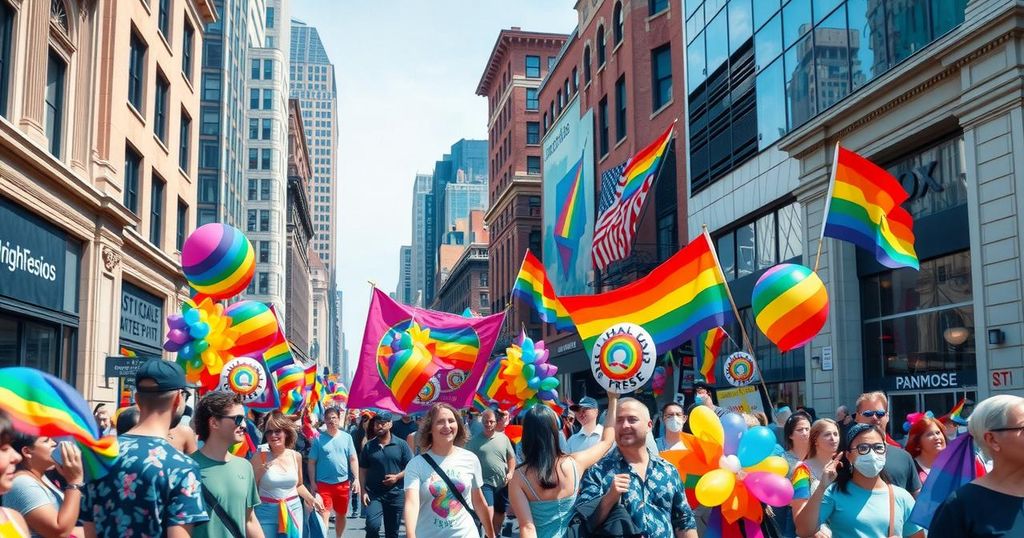The article discusses recent developments affecting intersex and LGBTQ+ communities globally, including Kenya’s recognition of intersex identity, U.S. Supreme Court decisions on foreign aid, sponsorship issues in Toronto Pride, and Hungary’s government restrictions on Pride parades. It also covers protests against homophobia in the UK and changes in policies regarding transgender individuals in organizations and legislation. Advocacy groups continue to face challenges in multiple areas, illustrating the ongoing struggles for rights and recognition.
In Kenya, intersex individuals are defining their identity separately from the broader queer community, seeking legitimacy as a distinct third gender. This strategic separation, according to Erasing 76 Crimes, is aimed at advancing intersex recognition without the complications associated with queer identities. Recent developments include intersex being formally recognized in birth notification certificates, as stated by Dennis Wamalwa from the Kenya National Commission on Human Rights.
The U.S. Supreme Court has rejected a request from the Trump administration to maintain a freeze on billions in approved foreign aid, with a 5-4 vote. This ruling allows the administration to contest the ruling in lower courts after the aid is scheduled for release. Advocacy groups like the AIDS Vaccine Advocacy Coalition are among those challenging the fund’s freeze, which supports essential health programs.
In Lesotho, the LGBTQ+-rights group The People’s Matrix refuted claims made by former President Trump regarding receiving $8 million in funding from the U.S. during his congressional address. Spokesperson Tampose Mothopeng declared that the organization is not receiving any U.S. grants, while the Foreign Affairs Minister expressed shock at Trump’s comments.
Hungary’s government is enforcing restrictions on the Budapest Pride parade, which has occurred for nearly three decades. Authorities cite alleged concerns about child protection as justification for limiting public presence. LGBTQ+ advocates criticize this initiative, asserting that such measures undermine the essence of Pride. The Hungarian government previously enacted laws restricting same-sex adoption rights.
In Canada, Toronto Pride is witnessing sponsor withdrawals linked to the climate resulting from Trump’s backlash against diversity and inclusion initiatives. Executive Director Kojo Modeste reported significant funding withdrawals from reputable sponsors, including Nissan Canada, over marketing evaluations. These disruptions pose challenges for the festival’s planning and execution.
A protest is slated in the UK on March 31 in remembrance of drag queen Heklina, highlighting ongoing issues of homophobia within the Metropolitan Police. Organizers, led by drag performer Peaches Christ, will march from Big Ben to the police HQ, featuring speeches from other prominent figures in the drag community.
The United States has officially withdrawn from the U.N. LGBTI Core Group, an essential assembly advocating for LGBTQI+ rights. Current co-chairs include Chile and the Netherlands, with various countries participating. This departure marks a shift in U.S. foreign policy, which until recently emphasized support for global LGBTQI+ rights.
Edinburgh Women’s Aid has enacted a policy excluding trans women and non-binary individuals from its services, citing differing perspectives on gender and sex. This policy contrasts with Scottish Women’s Aid, which maintains an inclusive stance for its support services, reflecting ongoing debates surrounding trans rights in women’s organizations.
New draft legislation in Turkey may criminalize the promotion of LGBTQ+ rights, embedding definitions of “biological sex” within the law. This potential legislation comes amid President Erdogan’s declaration of 2025 as the
This comprehensive overview highlights significant events impacting LGBTQ+ rights across various countries. From Kenya’s recognition of intersex identity to the U.S. withdrawal from the UN LGBTI Core Group and Hungary’s restrictions on Pride, it underscores ongoing struggles for legitimacy and rights within communities. Additionally, concerns over funding and policies further complicate the dynamics of advocacy and inclusion. Emphasizing the necessity for continual dialogue and support can drive progress within these movements.
Original Source: windycitytimes.com






